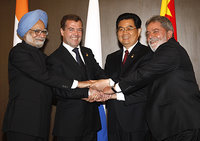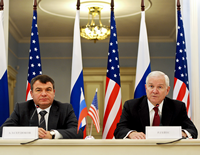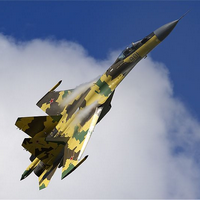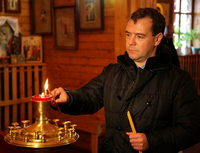Russia and India recently announced that they are cooperating on developing joint liquefied natural gas projects. In an email interview, Jörg Himmelreich, a senior fellow at the German Marshall Fund of the United States, discussed energy relations between Russia and India. WPR: Historically, what has been the energy relationship between Russia and India? Jörg Himmelreich: India and Russia have a formal strategic partnership dating back to the Cold War, when they were each other’s single most important partner. Even after the demise of the Soviet Union, they enjoyed traditionally good relations, although the resulting fundamental shift in the global order […]
Russia Archive
Free Newsletter

The U.S.-led intervention in Libya is now in full swing, thanks to a 10-0 vote by the U.N. Security Council in favor of authorizing military force. But the seeming unanimity of the vote belies key abstentions from a wary Germany as well as Brazil, Russia, India and China — the four emerging economic powers known as the BRICs. The BRICs’ abstentions raise difficult questions about the future of a rules-based international order at a time of relative U.S. decline. The BRICs’ move seemed to be grounded in their longtime allergy to Western-led military operations. Couched in language of humanitarian concern, […]
A number of attempts to create alternatives to the U.S. Global Positioning System are underway. Russia is close to completing its GLONASS system, which India plans to join, while China is working on developing its own system. In an email interview, Charles Vick, senior technical and policy analyst for GlobalSecurity.org, discussed global satellite navigation systems. WPR: What countries are currently pursuing a global navigation satellite system (GNSS) capability and what is the status of their programs? Charles Vick: The Global Positioning System (GPS), the global navigation system developed by the U.S., remains the primary system used by both the military […]

Robert Gates has just completed his first and perhaps his last trip to Russia as secretary of defense under President Barack Obama. Although the two-day visit produced little of substance, some of Gates’ public reflections help us understand how much the Russian-U.S. military relationship has improved during the last few years. As expected, much of the media coverage concerned Russia’s response to the military intervention in Libya led by the U.S., Britain and France. The apparent split between Prime Minister Vladimir Putin, who denounced the intervention as a “crusade,” and President Dmitry Medvedev, who mildly rebuked his erstwhile boss, attracted […]

The Russian government recently announced its goals for Russia’s rearmament, with a shopping list that includes 100 ships, 600 airplanes, and 1,000 helicopters over the course of the coming decade. Although these figures make for spectacular headlines, they give a misleading impression of the extent of Russia’s likely military buildup. First Deputy Defense Minister Vladimir Popovkin, who is in charge of arms procurement, confirmed that the Ministry of Defense (MOD) envisages spending roughly $650 billion from 2011-2020 for its new State Armaments Program (SAP), which also includes more than $100 billion for the other Russian security services outside the MOD. […]
Russia, Iran and Azerbaijan recently signed a series of railway agreements aimed at implementing the North-South Transport Corridor, including constructing rail links to connect the Iranian cities of Qazvin, Rasht and Astara. In an e-mail interview, Taleh Ziyadov, a doctoral fellow at Cambridge University, and Regine A. Spector, a visiting research fellow at the Woodrow Wilson Center’s Kennan Institute, discussed transport cooperation among Russia, Iran and Azerbaijan. WPR: How extensive are the existing transportation links among the three countries? Taleh Ziyadov and Regine A. Spector: Azerbaijan and Russia are connected by railroad and by a recently constructed modern highway linking […]
With the Russian government having assumed an increasingly aggressive posture regarding the country’s territorial dispute with Japan in recent months, the question naturally arises, Why? Senior Russian leaders including President Dmitry Medvedev and Defense Minister Anatoly Serdyukov have broken with precedent and visited what the Russians call the Southern Kurils and what the Japanese label their Northern Territories. The Russian government has also announced plans to enhance the islands’ socio-economic development and defenses. The escalating crisis led the counselor for European Affairs at the Japanese Foreign Ministry to characterize the Russian-Japanese relationship last week as being at its lowest point […]

With the Russian government having assumed an increasingly aggressive posture regarding the country’s territorial dispute with Japan in recent months, the question naturally arises, Why? Senior Russian leaders, including President Dmitry Medvedev and Defense Minister Anatoly Serdyukov, have broken with precedent and visited what the Russians call the Southern Kurils and what the Japanese label their Northern Territories. The Russian government has also announced plans to enhance the islands’ socio-economic development and defenses. The escalating crisis led the counselor for European Affairs at the Japanese Foreign Ministry to characterize the Russian-Japanese relationship last week as being at its lowest point […]
